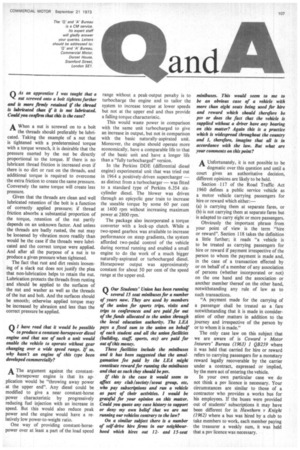Q Our Students' Union has been running several 15 seat minibuses
Page 109

If you've noticed an error in this article please click here to report it so we can fix it.
for a number of years now. They are used by members of the union for sports trips, visits and trips to conferences and are paid for out of the funds allocated to the union through the local education authority. The LEA pays a fixed sum to the union on behalf of each student and all the union facilities (building, staff, sports, etc) are paid for out of this money.
These facilities include the minibuses and it has been suggested that the amalgamation fee paid by the LEA might constitute reward for running the minibuses and that as such they should be psv.
If this is the case it would seem to affect any club 'society lscout group, etc, who pay subscriptions and run a vehicle as part of their activities. I would be grateful for your opinion on this matter. Could you quote any case history to support or deny my own belief that we are not running our vehicles contrary to the law?
On a similar subject there is a number of self-drive hire firms in our neighbourhood which hires out 12and 15-seat minibuses. This would seem to me to be an obvious case of a vehicle with more than eight seats being used for hire and reward which should therefore be psv or does the fact that the vehicle is supplied without a driver have any bearing on this matter? Again this is a practice which is widespread throughout the country and I, therefore, imagine that all is in accordance with the law. But what are your comments on this point?
AUnfortunately, it is not possible to be dogmatic over this question and until a court gives an authoritative decision, different opinions are likely to be held. Section 117 of the Road Traffic Act 1960 defines a public service vehicle as a motor vehicle carrying passengers for hire or reward which either:—
(a) is carrying them at separate fares, or (b) is not carrying them at separate fares but is adapted to carry eight or more passengers.
Obviously the important phrase from your point of view is the term "hire or reward". Section 118 takes the definition a little further; it reads "a vehicle is to be treated as carrying passengers for hire or reward if payment irrespective of the person to whom the payment is made and, in the case of a transaction effected by or on behalf of a member of any association of persons (whether incorporated or not) on the one hand and the association or another member thereof on the other hand, notwithstanding any rule of law as to such transactions.
"A payment made for the carrying of a passenger shall be treated as a fare notwithstanding that it is made in consideration of other matters in addition to the journey and irrespective of the person by or to whom it is made."
The only case law on this subject that we are aware of is Coward v Motor Insurers' Bureau (1%3) 1 QB259 where it was held that carried for hire or reward refers to carrying passengers for a monetary reward legally recoverable by the carrier under a contract, expressed or implied, by the mere act of entering the vehicle.
In your own particular case we do not think a psv licence is necessary. Your circumstances are similar to those of a contractor who provides a works bus for his employees. If the buses were provided out of students' subscriptions it may have been different for in Hawthorn v Knight (1962) where a bus was hired by a club to take members to work, each member paying the treasurer a weekly sum, it was held that a psv licence was necessary.
















































































































































































